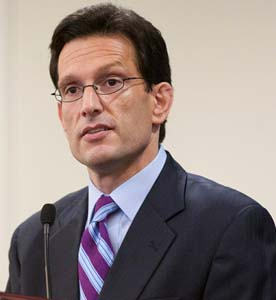Rutgers political scientist Ross K. Baker weighs in on the significance of the House Majority Leader’s loss and what it means for the future of immigration reform

House Majority Leader Eric Cantor’s stunning primary defeat has the potential to reshape national politics for years to come. Pundits are speculating whether it will mean the death of immigration reform and even less cooperation in Washington. Rutgers Today spoke with Ross K. Baker – a professor of political science who is a former research associate at the Brookings Institution and has worked on Capitol Hill – about the significance of Cantor’s defeat in Virginia and its potential ripple effect through the nation.
Rutgers Today: How did David Brat, a little-known candidate with a shoe string budget and no major organizational backing, knock out the house majority leader in a primary?
Baker: There are any number of things that can account for it. Was it the effect of talk radio? Was it immigration” Or was it just an anti-establishment, anti-Washington sentiment? It could have been over-confidence on Cantor’s part. He tends to be a super serious guy. He is not a particularly warm person. He is not that great a retail politician. It may be that David Brat was a good ‘grip and grin’ person and was better interacting with the voters.
This district is also clearly a hotbed of Tea Party activity. I think Cantor thought he was conservative enough to satisfy his constituents, but I think he made a big mistake when he came out in favor of a variation of the Dream Act providing legislation for kids who were brought here illegally as children. That is a toxic thing as far as the Tea Party is concerned and I think he underestimated that.
Rutgers Today: Was immigration really a deciding issue in this race?
Baker: I have to believe it was. There is a big movement of Latinos and South Asians into the suburbs of Richmond, into what had previously been a pretty homogeneous white suburban area. I think you are getting ethnic push back and that situation coalesces around immigration reform.
There is a real consuming anger that has grown up over the last several weeks among older voters who tend to be Republican about the influx of unaccompanied children at the border. It has been going on for a year but has only recently gotten publicity. And I think there is a sense among a lot of older Americans of being culturally enveloped by the rest of the world, and these are the people who vote.

Rutgers Today: What does the outcome of the primary mean for the last two years of the Obama presidency and the future of immigration reform?
Baker: I think it will be a period of almost barren accomplishment. Immigration is absolutely stone cold dead. It is not going to happen. You have all these Republican members looking at what happened to Cantor for making a very modest proposal on immigration and they are all as nervous as a Christmas goose.
Rutgers Today: Republican leadership has been working very hard to beat back the Tea Party in most primaries to improve the GOP’s chances in the general election. What does David Bratt’s victory signal about the strength of the Tea Party?
Baker: Reports of its demise were premature. I think its durability has surprised a lot of people. It is not a party in the sense of an organized political party: It’s something that has coalesced around a number of issues – taxation, the deficit, immigration. If the issues are there, and the grievances maintained, than the movement lives. It does in fact produce candidates that are so extreme that is it hard to win in a general election – and this is a problem for the Republican Party.
Rutgers Today: What do you think the long-term consequence of Cantor’s loss will be in Washington and beyond?
Baker: It is going to depress legislative activity in the House of Representatives and perhaps even in the Senate. It is going to have a lot of prominent Republicans who are going to face primary elections really looking over their records, seeing what their weak spots are and trying to avoid them. I think the overall effect is going to be to intensify the gridlock.
For more information contact Andrea Alexander at 848-932-0556 or aalexander@ucm.rutgers.edu